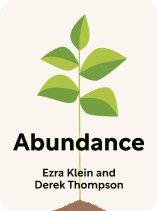1-Page Summary1-Page Book Summary of Abundance
In Abundance (2025), New York Times columnist Ezra Klein and Atlantic writer Derek Thompson argue that America can create a world of plentiful resources and improved living standards, but is being held back by manufactured scarcities and barriers to production. Their central thesis is that by removing bureaucratic obstacles to housing construction, energy infrastructure, and other essentials while reinvigorating scientific innovation, we can solve major challenges like climate change, housing shortages, and economic stagnation. They argue that this “abundance agenda” represents a new direction for liberalism: one focused on increasing the supply of essential goods and services rather than merely redistributing existing resources.
Abundance attempts to address a core problem affecting Americans across the political spectrum: that the rising costs of housing, health care, education, and other necessities have outpaced wage growth. Klein, who founded Vox Media before joining the New York Times as a columnist and podcast host, and Thompson, a staff writer at The Atlantic known for his coverage of economics and technology, published the book during a period of intense political polarization. They offer their abundance agenda as a potential third way toward social and economic progress beyond traditional left-right divides.
Written primarily for a progressive audience, the book challenges liberals to reconsider their regulation-focused approach to governance and embrace a more pro-building, pro-innovation...
Want to learn the ideas in Abundance better than ever?
Unlock the full book summary of Abundance by signing up for Shortform.
Shortform summaries help you learn 10x better by:
- Being 100% clear and logical: you learn complicated ideas, explained simply
- Adding original insights and analysis, expanding on the book
- Interactive exercises: apply the book's ideas to your own life with our educators' guidance.
Here's a preview of the rest of Shortform's Abundance summary:
Abundance Summary What Is Abundance?
Klein and Thompson begin by establishing what abundance means and how it contrasts with our current state of manufactured scarcity. This section explores their vision of a plentiful future, traces how America shifted from a building mindset to a constraining one, and examines how excessive regulation creates bottlenecks in housing, energy, transportation, and innovation.
Defining Abundance and Scarcity
Klein and Thompson envision a future where society produces more than enough of what people need to live fulfilling lives. Abundance means ensuring everyone has access to affordable housing, clean energy, reliable transportation, high-quality health care, and educational opportunities. The authors describe what life could look like in 2050: clean energy flowing abundantly from nuclear plants and solar panels, vertical farms growing fresh produce in urban centers, lab-grown meat reducing environmental impact, and artificial intelligence boosting productivity while letting people devote more time to leisure, creativity, and family.
(Shortform note: Policy analyst Tony Dutzik offers a counterpoint to Klein and Thompson’s vision of abundance: He argues that by many...
Abundance Summary Why Do We Need to Shift From Scarcity to Abundance?
Klein and Thompson present three arguments for why we need to abandon the scarcity mindset: It causes material harm to everyday people, it weakens democratic stability, and its effects on society are morally indefensible.
Lack of Supply Causes Measurable Harm
The most direct case for abundance is improving people’s daily lives. Klein and Thompson note that when essential goods are scarce, everyone suffers—but especially those with fewer resources. For example, Klein and Thompson note that 30% of Americans are “house poor,” spending at least 30% of their income on housing, which reduces resources for other necessities, education, health care, and saving for the future. Meanwhile, our failure to build energy infrastructure means clean energy projects remain disconnected from the grid, while scientific stagnation means that potentially life-saving medical treatments remain undiscovered or undeveloped.
These scarcities compound each other. When housing costs prevent people from moving to where their skills are most valuable, productivity suffers. When infrastructure is inadequate, businesses face higher costs. When scientific progress slows, technological solutions...
What Our Readers Say
This is the best summary of How to Win Friends and Influence People I've ever read. The way you explained the ideas and connected them to other books was amazing.
Abundance Summary How to Advance an Abundance Agenda
Klein and Thompson argue that several factors make this the right moment to embrace an abundance agenda. They explain that public frustration with institutional failures has created an openness to new approaches: Americans across the political spectrum recognize something is broken in our capacity to build for the future. Meanwhile, compounding crises—from climate change to housing shortages to pandemic-exposed vulnerabilities—demand responses beyond mere incremental adjustments. Technological advances in renewable energy, AI, and biotechnology have created vast potential for improvements in living standards and sustainability—if we remove barriers to deployment and scaling.
Could This Be the Moment for Abundance?
While Americans across political lines are deeply pessimistic about the country’s direction, as Klein and Thompson suggest, this frustration might not translate into support for expanded government action. Trust in the federal government has remained low for decades, with less than a quarter of Americans expressing faith that...
Shortform Exercise: Identify Scarcity in Your Community
Klein and Thompson argue that many of our most pressing problems stem from “chosen scarcity” rather than actual resource limitations. Recognizing chosen scarcities is the first step toward creating abundance.
What’s one example of chosen scarcity you’ve observed in your community (housing, transportation, energy, and so on)? What specific rules, processes, or bottlenecks might be creating this scarcity?
Why people love using Shortform
"I LOVE Shortform as these are the BEST summaries I’ve ever seen...and I’ve looked at lots of similar sites. The 1-page summary and then the longer, complete version are so useful. I read Shortform nearly every day."
 Jerry McPhee
Jerry McPhee

